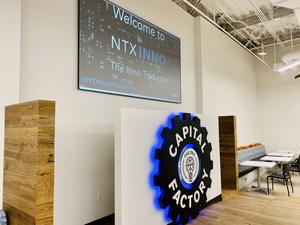
While the pandemic has moved many accelerator programs online, the work they do to guide startup growth goes on.
And joining the newest virtual cohort of eight startups in Colorado-based Catalyst Accelerator’s Cyber for Space Applications is Dallas-based Astrapi Corporation, a signal modulation-focused telecommunications startup.
The Catalyst Accelerator works with the Air Force Research Lab Space Vehicles Directorate and the recently created U.S. Space Force to find and grow startups working in the aerospace and defense industries that have technological applications in the public and private sector.
“We’re looking forward to bringing the eight small businesses together to provide guidance to develop the most innovative cyber solutions for the warfighter.” Cpt. Keith Hudson, government lead for the Cyber for Space Applications, said in a statement.
As part of the 12-week virtual program, which kicks off on September 1, cohort members are paired with an Air Force and commercial liaison, which Catalyst calls Sherpas, to help guide them through the process of making Department of Defense and other business connections. And like many accelerators, the program also includes mentoring and funding opportunities, as well as a demo day to cap it off in November.
This new group marks the sixth cohort for the Cyber for Space Applications. Since its launch Catalyst has seen 38 startups go thorough its program, including Texas AI and computer visions startup Third Insight, which have gone on to raise more than $48 million in public and private funding.
Astrapi was launched in 2009 by co-founders David Shaw and Jerrold Prothero. The company’s communication technology uses spiral-based modulation with varying amplitude, which allows for more efficient data transmission, more reliable networks and the ability to receive signals in deep space that would otherwise be too weak to receive. Astrapi is currently working on the second generator prototype of its tech. Since its founding, the company has raised about $1.5 million in grant, VC and other funding with backers including Ascend Venture Capital and Maryland-based angel investment group the Dingman Center for Entrepreneurship. The company has also received funding through Texas A&M’s New Ventures Competition.
Check out the other seven startups joining the cohort below (descriptions are provided by Catalyst).
ANOVA Intelligence’s groundbreaking computational approach to anomaly detection is revolutionizing cyberwarfare engagement for U.S. companies and allies globally.
ARMS Cyber Defense combines micro patching and moving target defense technologies to diversify application code structures. This eliminates known vulnerabilities and protects against zero-day attacks by shuffling vulnerabilities around with no added latency to the user (similar to radio frequency hopping).
CyberCentric Technologies, Inc. enables organizations to identify, manage, and protect their most sensitive data using artificial intelligence.
Corlina Inc.’s platform creates a record of IoT events that establishes an immutable chain of evidence on collected data to certify security and accuracy. It is designed to be lightweight and non-intrusive with a distributed SaaS API architecture built for scalability and resiliency.
DornerWorks, Ltd.’s VM Composer™ is the “easy button” to help you develop virtualized systems faster and easier using the high assurance, open source seL4 hypervisor. This tool simplifies how you configure, build, and deploy your virtual machines, reducing costs and bringing new features to your embedded product.
Lyteloop now makes it possible to harness the power of light to store huge amounts of data in spaced based hyperscale data centers. Achieved through the use of ultra-high bandwidth lasers, data now moves in an endless circulating loop.
Vitro Technology Corporation is a zero-trust IoT company. Zero-trust relies on the objective authentication of secret and secure IoT data, served via PAM and IAM policies to multi-domain operations and trusted automation. Trusted automation includes AI, ML, digital twins and the virtual tools we all rely on.







